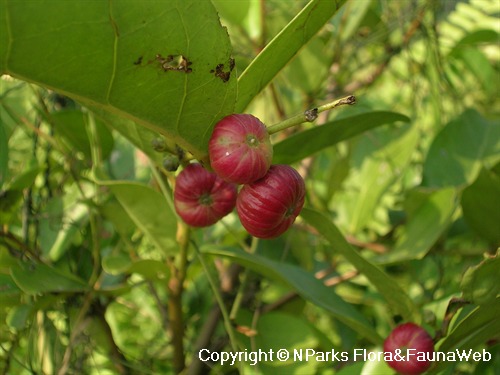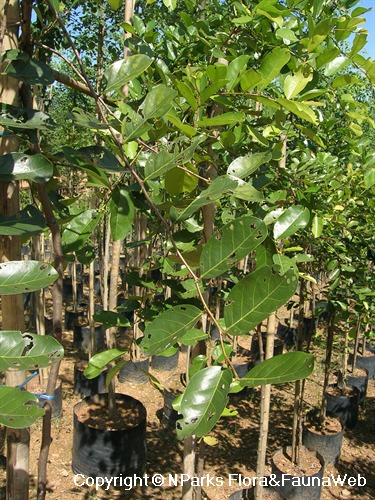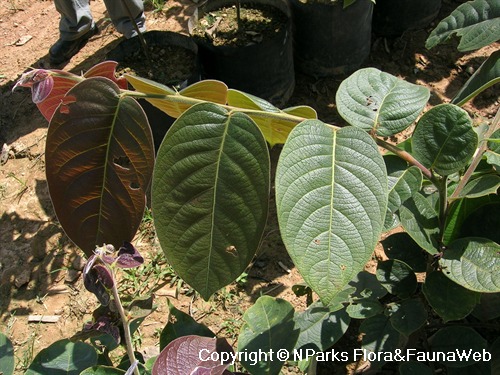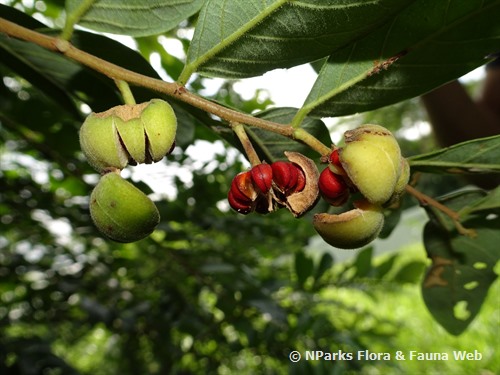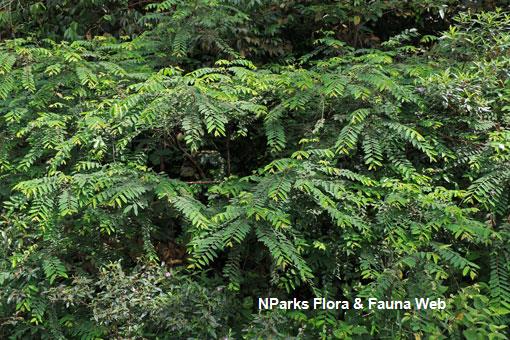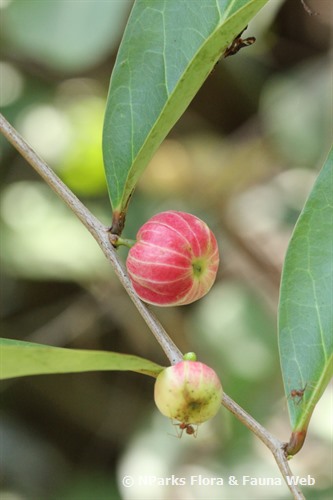
Back
Glochidion littorale Blume
| Family Name: | Phyllanthaceae |
| Synonyms: | Glochidion hongkongense |
| Common Name: | Monkey Apple, Jambu Kera, Selensur |
Name
Classifications and Characteristics
| Plant Division | Angiosperms (Flowering Seed Plants) |
|---|---|
| Plant Growth Form | Tree (Small (6m-15m)) |
| Lifespan (in Singapore) | Perennial |
| Mode of Nutrition | Autotrophic |
Biogeography
| Native Distribution | India, Sri Lanka, Indochina, Southeast Asia, Philippines |
|---|---|
| Native Habitat | Shoreline (Backshore, Sandy Beach) |
| Preferred Climate Zone | Tropical |
| Local Conservation Status | Native to Singapore (Endangered (EN)) |
Description and Ethnobotany
| Growth Form | Shrub or small tree that grows up to 6 m tall. |
|---|---|
| Foliage | Smooth, alternate leaves are obovate with entire leaf margin, rounded leaf tips and short petioles. Young foliage is red and edible, while mature foliage is leathery and glossy green. They turn yellow with red patches before dying. |
| Flowers | Small, unisexual flowers lack petals and occur in dense clusters in the leaf axil. Female flowers are composed of 6 slightly fused sepals that form an egg-like shape. They have a short stalk. Male flowers are also composed of 6 sepals, but they are arranged in 2 overlapping sets of 3 sepals. They have a longer stalk (4-5 times longer than that of the female) and hang downwards. |
| Fruit | Shiny, red fruits are donut-shaped (1.5-2 cm wide) with longitudinal grooves and a deep dimple at the apex. It is classified as a capsule, splitting apart at the grooves into 10 to 15 pieces that each contain 2 red seeds. |
| Habitat | Typically found on sandy seashores and back mangroves. |
| Associated Fauna | The Leaf-flower Moth (Epicephala species) pollinates the flowers and deposits eggs in the plant’s ovary. After the fruit develops, the moth caterpillar then feed on some of the seeds. |
Landscaping Features
| Landscape Uses | Coastal, Beachfront / Shoreline |
|---|
Plant Care and Propagation
| Light Preference | Full Sun |
|---|---|
| Water Preference | Moderate Water |
| Plant Growth Rate | Moderate |
| Rootzone Tolerance | Waterlogged Soils |
Foliar
| Foliage Retention | Evergreen |
|---|---|
| Mature Foliage Colour(s) | Green |
| Mature Foliage Texture(s) | Smooth, Glossy / Shiny |
| Prominent Young Flush Colour(s) | Red |
| Foliar Type | Simple / Unifoliate |
| Foliar Arrangement Along Stem | Alternate |
| Foliar Attachment to Stem | Petiolate |
| Foliar Shape(s) | Non-Palm Foliage (Obovate) |
| Foliar Venation | Pinnate / Net |
| Foliar Margin | Entire |
| Foliar Apex - Tip | Rounded |
| Foliar Base | Acute |
| Leaf Area Index (LAI) for Green Plot Ratio | 3.0 (Tree - Intermediate Canopy) |
Floral (Angiosperm)
| Flower & Plant Sexuality | Unisexual Flowers |
| Flower Colour(s) | Green |
|---|---|
| Flower Grouping | Cluster / Inflorescence |
| Flower Location | Axillary |
| Flower Symmetry | Radial |
| Individual Flower Shape | Urceolate / Urn-shaped, Stellate / Star-shaped |
| Flowering Habit | Polycarpic |
Fruit, Seed and Spore
| Mature Fruit Colour(s) | Red |
|---|---|
| Fruit Classification | Simple Fruit |
| Fruit Type | Dehiscent Dry Fruit , Capsule |
| Mature Seed Colour(s) | Red |
| Seed Quantity Per Fruit | Numerous (>20) |
References
| References | Polunin, Ivan. 2010. Plants and Flowers of Singapore. Malaysia: Marshall Cavendish Editions . |
|---|
Image Repository
Others
| Master ID | 1643 |
|---|---|
| Species ID | 2936 |
| Flora Disclaimer | The information in this website has been compiled from reliable sources, such as reference works on medicinal plants. It is not a substitute for medical advice or treatment and NParks does not purport to provide any medical advice. Readers should always consult his/her physician before using or consuming a plant for medicinal purposes. |


